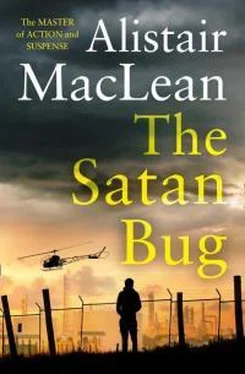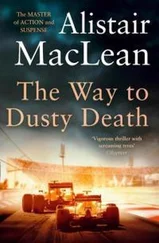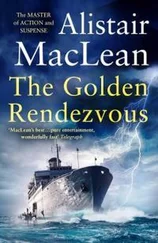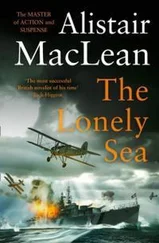Алистер Маклин - The Satan Bug
Здесь есть возможность читать онлайн «Алистер Маклин - The Satan Bug» — ознакомительный отрывок электронной книги совершенно бесплатно, а после прочтения отрывка купить полную версию. В некоторых случаях можно слушать аудио, скачать через торрент в формате fb2 и присутствует краткое содержание. Год выпуска: 2011, Издательство: Sterling, Жанр: Боевик, Шпионский детектив, на английском языке. Описание произведения, (предисловие) а так же отзывы посетителей доступны на портале библиотеки ЛибКат.
- Название:The Satan Bug
- Автор:
- Издательство:Sterling
- Жанр:
- Год:2011
- ISBN:нет данных
- Рейтинг книги:3 / 5. Голосов: 1
-
Избранное:Добавить в избранное
- Отзывы:
-
Ваша оценка:
- 60
- 1
- 2
- 3
- 4
- 5
The Satan Bug: краткое содержание, описание и аннотация
Предлагаем к чтению аннотацию, описание, краткое содержание или предисловие (зависит от того, что написал сам автор книги «The Satan Bug»). Если вы не нашли необходимую информацию о книге — напишите в комментариях, мы постараемся отыскать её.
The Satan Bug — читать онлайн ознакомительный отрывок
Ниже представлен текст книги, разбитый по страницам. Система сохранения места последней прочитанной страницы, позволяет с удобством читать онлайн бесплатно книгу «The Satan Bug», без необходимости каждый раз заново искать на чём Вы остановились. Поставьте закладку, и сможете в любой момент перейти на страницу, на которой закончили чтение.
Интервал:
Закладка:
He hung up and I stood there staring at the silent telephone. The General was a personal appointee of the Prime Minister and the Home Secretary. His identity was also known to the chiefs of espionage and counter-espionage – it had to be. An Assistant Commissioner, Hardanger himself, the Commandant and security chief at Mordon – and that ended the list of those to whom the General’s identity was known. It was an ugly thought. I wondered vaguely how General Cliveden was going to enjoy the next couple of hours – I didn’t require any powers of telepathy to know where Hardanger would be heading as soon as he had put down that phone. Of all our suspects, only Cliveden knew the General’s identity. Maybe I should have been paying more attention to General Cliveden.
A shadow darkened the hall doorway. I glanced up to see three khaki-clad figures standing at the head of the outside steps. The man in the centre, a sergeant, had his hand raised to the bell-push but lowered it when he caught sight of me.
“I’m looking for an Inspector Gibson,” he said. “Is he here?”
“Gibson?” I suddenly remembered that was me. “I’m Inspector Gibson, Sergeant.”
“I’ve something here for you, sir.” He indicated the file under his arm. “I’ve been ordered to ask for your credentials first of all.”
I showed them and he handed over the file. He said, apologetically, “I’m under orders not to let that out of my sight, sir. Superintendent Hardanger said it came from Mr. Clandon’s records offices and I understand it’s highly confidential.”
“Of course.” Followed by the sergeant who was flanked by a couple of hefty privates, I walked into the living-room, ignoring the outraged glare of Mrs. Turpin who had belatedly appeared on the scene. I asked her to leave and she did, glowering savagely.
I broke the seal and opened the file. It contained a spare seal for re-sealing the cover and a copy of Dr. MacDonald’s security report. I’d seen the report before, of course, when I’d taken over as head of security from the vanished Easton Derry, but had paid no particular attention to it. I’d had no special reason to. But I had now.
There were seven pages of foolscap. I went through it three times. I didn’t miss a thing the first time and if possible even less the next two. I was looking for even the tiniest offbeat jarring note that might give me even the most insubstantial lead, Senator McCarthy sniffing out a Communist had nothing on me, but I found not the slightest trace of anything that might have been helpful. The only odd thing, as Hardanger had pointed out, was the extremely scanty information about MacDonald’s Army career, and to information Easton Derry – who had indeed compiled the report – must have had access. But nothing, except for a remark at the foot of a page that MacDonald, entering the Army as a private in the Territorials in 1938, had finished his Army career in Italy as a lieutenant-colonel in a tank division in 1945. The top of the following page held a reference to his appointment as a government chemist in north-east England early in 1946. This could have been just the way Easton Derry had compiled the report: or not.
With the blade of my penknife, and ignoring the sergeant’s scandalised look, I pried open the buckram corner holding the top left hand corners of the pages together. Under this was a thin wire staple, the kind of staple that comes with practically every kind of commercial stapler. I bent the ends back at right angles, slid the sheets off and examined them separately. No sheet had more than one pair – the original pair – of holes made by the stapler. If anyone had opened that staple to remove a sheet, he’d replaced it with exceptional care. On the face of it, it looked as if that file hadn’t been tampered with.
I became aware that Carlisle, the plain-clothes detective-sergeant, was standing beside me, holding a bundle of papers and folders. He said, “This might interest you, sir. I don’t know.”
“Just a moment.” I clipped the sheets together again, pushed them into the file-holder, resealed it and handed it back to the army sergeant who took himself off along with his two companions. I said to Carlisle, “What are those?”
“Photographs, sir.”
“Photographs? What makes you think I’ll be interested in photographs, Sergeant?”
“The fact that they were inside a locked steel box, sir. And the box was in the bottom drawer – also locked – of a kneehole desk. And here’s a bundle found in the same place – personal correspondence, I would say.”
“Much trouble in opening the steel box?”
“Not with the size of hacksaw I use, sir. We’ve just about tied it all up now, Inspector. Everything listed. If I might venture an opinion, you’ll find little of interest in the list.”
“Searched the whole house? Any basement?”
“Just about the filthiest coal-cellar you ever clapped eyes on.” Carlisle smiled. “From what I’ve seen of Dr. MacDonald’s personal tastes he doesn’t strike me as the type of man who would keep even coal in a coal-cellar if he could find a cleaner and more luxurious place for it.”
He left me to his finds. There were four albums. Three of them were of the innocuous squinting-into-the-sun type of family albums you can find in a million British homes. Most of the photographs were faded and yellow, taken in the days of MacDonald’s youth in the twenties and thirties. The fourth album, of much more recent origin, was a presentation given to MacDonald by colleagues in the World Health Organisation in recognition of his outstanding services to the W.H.O. over many years – an illuminated address pasted to the inside front board said so. It contained over fifty pictures of MacDonald and his colleagues taken in at least a dozen different European cities. Most of the photographs had been taken in France, Scandinavia and Italy, with a sprinkling from a few other countries. They had been mounted in chronological fashion, each picture with date and location caption, the last having been taken in Helsinki less than six months previously.
The photographs in the album didn’t interest me: what did interest me was one photograph that was missing. From its place in the album it had almost certainly been taken about eighteen months previously. Its caption had been all but obliterated by horizontal strokes made in the same white ink used for all captions. I switched on the light and peered closely at the obliteration. No question but that the place name had once started with a T. After that it was hard to say. The next letter could have been either an O or a D. O, I felt sure – there was no city in Europe beginning with TD. The remainder of the word was completely obliterated. TO … About six letters in length, possibly seven. But none of the letters projected below the line, so that cut out all words with p’s and g’s and j’s and so forth.
What cities or towns in Europe did I know beginning with the letters TO and six or seven letters in length? Not so very many, I realised, at least not of any size, and the W.H.O. didn’t hold its meetings in villages. Torquay – no good, letters projecting below. Totnes – too small. In Europe? Tornio in Sweden, Tondor in Denmark – again both relatively insignificant. Toledo, now – no one could call that a village: but MacDonald had never been to Spain. The best bets were probably either Tournai in Belgium or Toulon in France. Tournai? Toulon? For a moment or two I mulled the names over in my mind. I picked up the bundle of letters.
There must have been thirty or forty letters in the bundle, faintly scented and tied, of all things, with a blue ribbon. Of all the things I would have expected to find in Dr. MacDonald’s possession, this was the last. And, I would have bet a month’s salary, the most useless. They looked like love letters and I didn’t particularly relish the prospect of making myself conversant with the good doctor’s youthful indiscretions but just at that moment I would have read Homer in the original if I thought it would be any good to me. I untied the bow on the ribbon.
Читать дальшеИнтервал:
Закладка:
Похожие книги на «The Satan Bug»
Представляем Вашему вниманию похожие книги на «The Satan Bug» списком для выбора. Мы отобрали схожую по названию и смыслу литературу в надежде предоставить читателям больше вариантов отыскать новые, интересные, ещё непрочитанные произведения.
Обсуждение, отзывы о книге «The Satan Bug» и просто собственные мнения читателей. Оставьте ваши комментарии, напишите, что Вы думаете о произведении, его смысле или главных героях. Укажите что конкретно понравилось, а что нет, и почему Вы так считаете.












